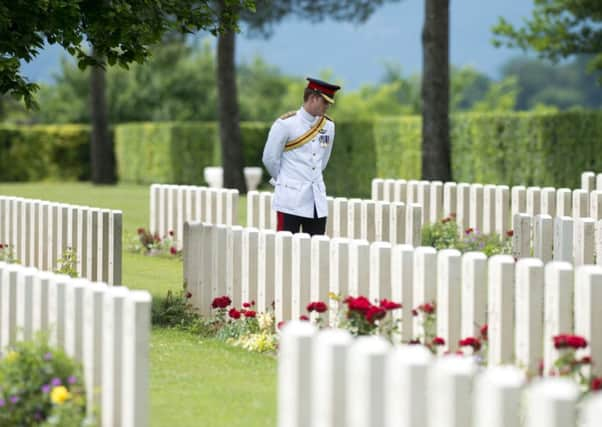A moment of reflection as Harry pays tribute to Monte Cassino war dead


Touring the Commonwealth Cemetery at Cassino, the prince, a serving army officer, joined veterans, dignitaries and representatives of British regiments and Forces’ organisations at a moving open-air service to mark the 70th anniversary of the battle of Monte Cassino, where tens of thousands of men fought and died to take the strategically important monastery.
Harry was first to lay a wreath of poppies with a handwritten note that said: “In memory of those who paid the ultimate sacrifice for our country, I thank you - Harry”.
Advertisement
Hide AdAdvertisement
Hide AdIn 1944 Nazi forces were encamped on the heavily fortified rocky outcrop, topped by the holy site, and were frustrating the Allies’ march north to Rome.
Taking the position was crucial, with Allied forces from Britain, America, New Zealand and beyond involved, but progress was slow, and under constant Nazi bombardment.
An estimated 250,000 men were killed or wounded before a Polish unit raised their national flag at the outcrop’s summit on May 18, 1944.
During the service a minute’s silence was observed after a bugler had sounded the Last Post.
Advertisement
Hide AdAdvertisement
Hide AdThe Chaplain General, the Reverend Jonathan Woodhouse told the congregation the area experienced some of the fiercest fighting in war.
He said: “The four main battles were symbolic of the intense demands and sacrifices made by soldiers for the battle for Rome and the wider Italian campaign.”
He added: “Stakes were high, the pressure was on and the fighting was intense but behind the history stands the courage and sacrifice of servicemen far from home, especially those servicemen who never came home and whom we remember today.”
At the reception veteran Ivor Gaskill, 90, who served with the Royal Hampshire Regiment as a private, faced the horrors of Monte Cassino aged just 18.
Advertisement
Hide AdAdvertisement
Hide AdHe said: “I remember trying to get up the hill - we were up to our waists in mud and water, soaking wet, hungry and full of lice.
“We were being shelled and shot at constantly but it was just a case of keep going. What else was there to do? You couldn’t run away.
“The hill was covered in snow and it never stopped raining. You had to do it all in darkness.
“The Germans were in the same state as us - they were wet through, cold and hungry like we were but they had the best position.
Advertisement
Hide AdAdvertisement
Hide Ad“We were just youngsters then - I was 18 going on 19. We were innocents.”
The veteran who returns each year to the site where so many of his friends died - welcomed Prince Harry’s visit saying: “I thought we were forgotten.
“It’s great to see him here. It’s marvellous of him to do it.”
The infantryman, from Canterbury in Kent, survived Cassino but was injured during a later attack near Lake Trasimeno in Umbria where he suffered shrapnel wounds “all over” and lost an eye.
The great grandfather stayed in the Army for 22 years.
Advertisement
Hide AdAdvertisement
Hide AdBritish vet Anthony Pittaccio, 85, from Felixstowe in Suffolk, who is of Italian descent, served with New Zealand forces at Cassino - and signed up while holidaying with his family near Cassino as a 14-year-old.
Of his decision to fight he said: “It was out of a sense of wanting to do something.
“Seeing all that going on you felt useless. I think that’s what inspired me to sign up - and I took a great liking to the New Zealanders.”
Mr Pittaccio had been on a break in Italy in 1939 with his family when the war broke out and they were stranded in the region.
Advertisement
Hide AdAdvertisement
Hide AdHe joined the war effort as an interpreter - but was not allowed to get involved in the action because of his age.
He said: “At headquarters where I was stationed, we were always under shell fire. It was deafening.
“But I was forbidden to go into a fire fight position and that was very frustrating. I wanted to go - I was a 14-year-old lad.
“I remember how we buried our own dead, we cared for our own wounded and we had to somehow find things to eat.”
The grand-dad returned to the UK after the war and was called to do National Service - but was excused because of his effort at Monte Cassino.